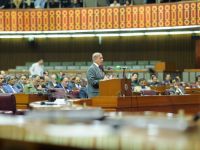The United States on Tuesday reopened is embassy in Jakarta to the public after a two week closure, saying that although a security threat still existed, protective measures had been upgraded.
"On Tuesday, November 7, 2000, the Embassy opened for public services. Routine visa and passport services are now available," the embassy said in a notice to US citizens.
"The Embassy still believes that a specific threat may be directed at Embassy facilities. The cooperation of Indonesian security authorities has permitted reopening to the public. We will continue to evaluate the situation and take further steps as necessary," the notice said.
It added that the mission would be closed again on Friday due to the Veteran's Day holiday.
In Washington overnight, State Department spokesman Richard Boucher told reporters that US officials hoped the embassy would be able to resume operations soon after closing to the public on October 24.
"The Indonesian national police have, in fact, increased their efforts to protect our mission in Jakarta," Boucher said.
"We're pleased with that response, and that's one of the factors that we're taking into account."
A State Department official said later that the embassy had been given authorization from Washington to reopen, but it was down to envoys in Jakarta to make the final decision based on local conditions.
Ambassador Robert Gelbard, who is in the United States on family business, was due to stop in Washington for "brief" consultations before returning to his post, Boucher added, although no firm dates were available.
The embassy closed citing "credible" security threats, and a notice issued Thursday said the mission would remain closed to the public at least until Tuesday.
The closure came as Gelbard became embroiled in a fiery war of words with senior Indonesian ministers who objected to the forthright nature of his criticisms of the Indonesian government.
But Foreign Minister Alwi Shihab and a presidential spokesman on Friday urged the embassy to reopen to avoid giving the impression that ties between Indonesia and Washington were strained.
Indonesian presidential spokesman Wimar Witoelar said the government was "dismayed" and upset by the closure and by a US warning that Indonesia was unsafe for US tourists.
The foreign minister had previously publicly made light of threats against the embassy which he said had included death threats to Gelbard, drawing an angry reaction from the embassy.
The embassy closure also came amid escalating protests in mainly Muslim Indonesia country the US failure to condemn Israel over the latest violence there and after an attack by Muslim youths on the US consulate in the coastal city of Surabaya – JAKARTA (AFP)
© 2000 Al Bawaba (www.albawaba.com)







